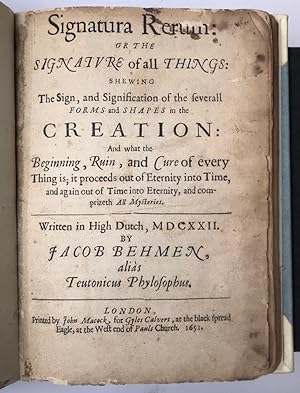A propos de cet article
4°, (8) 224 pp. Bound in 19th-century half-vellum. Last page repaired. Tear on p. 6 repaired with tape. Light browning throughout and staining to page edges (especially pp. 1-25), but does not affect the text. A good copy.A very rare, first edition copy of the English-language translation of Jakob Boehme's (1575-1642) Signatura rerum (1622). The writings of Boehme, a German mystic and theosopher, inspired the 17th-century Christian movement known as Behmenism. Controversial for its religious heterodoxy, Boehme's mysticism nevertheless attracted a great number of followers across continental Europe and England.This first-edition, English-language translation was published precisely during the height of Boehme's popularity in England, during the years of the Interregnum (1649-1660). A period of political turbulence, people turned increasingly to astrology, mysticism, and the occult. This text, the Signatura rerum, discusses how God bestowed every object at creation with a "signature" that connects the material and spiritual worlds, and that can be decoded and intepreted as part of the natural order. The publication of this edition contributed to a larger project, undertaken from 1645-1662 by John Ellistone, John Sparrow (Ellistone's cousin), Humphrey Blunden, and Giles Calvert, to translate and publish Boehme's oeuvre in England.B0859Mystiek - occultisme - astrologie - Boehmenisme - Behmenism, also Behemenism or Boehmenism, is the English-language designation for a 17th-century Christian movement based on the teachings of German mystic and theosopher Jakob Böhme (1575-1624). The term was not usually applied by followers of Böhme's theosophy to themselves, but rather was used by some opponents of Böhme's thought as a polemical term. The origins of the term date back to the German literature of the 1620s, when opponents of Böhme's thought, such as the Thuringian antinomian Esajas Stiefel, the Lutheran theologian Peter Widmann and others denounced the writings of Böhme and the Böhmisten. When his writings began to appear in England in the 1640s, Böhme's surname was irretrievably corrupted to the form "Behmen" or "Behemen", whence the term "Behmenism" developed. A follower of Böhme's theosophy is a "Behmenist". N° de réf. du vendeur 42391
Contacter le vendeur
Signaler cet article
![]()



